Burt A. The Evolution of the British Empire and Commonwealth From the American Revolution
Подождите немного. Документ загружается.

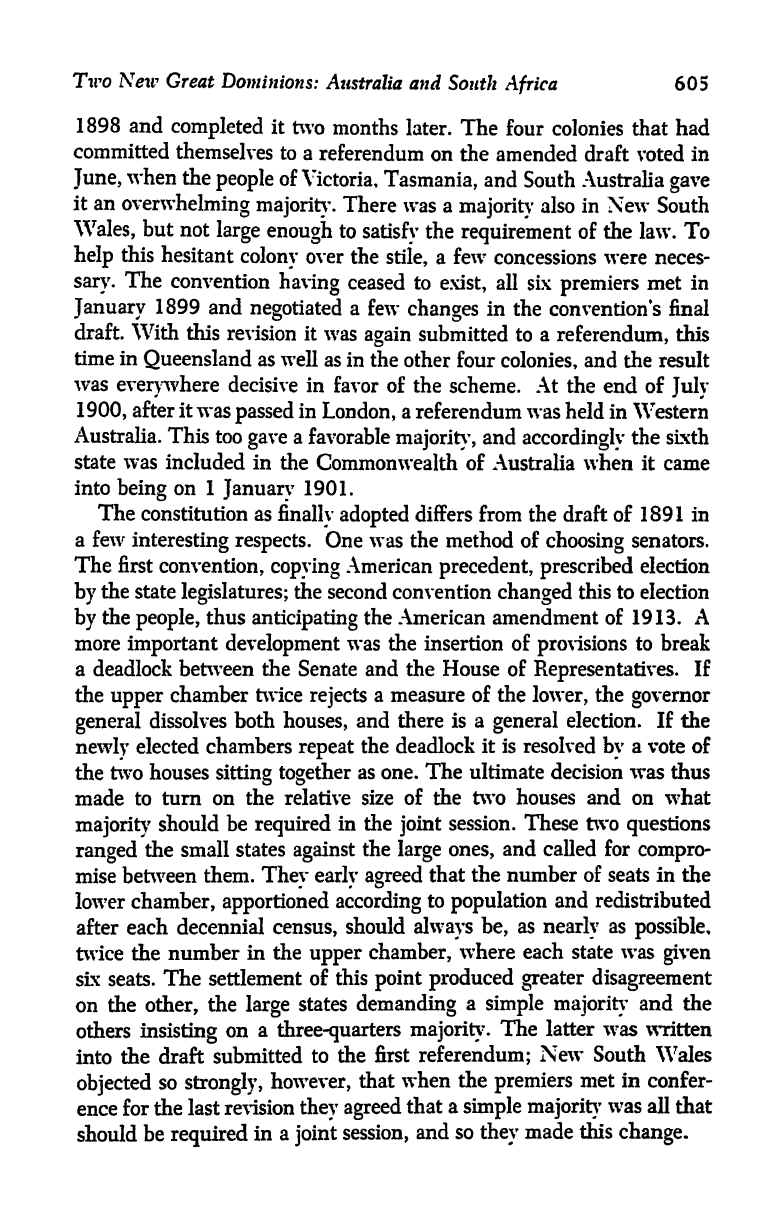
Tiro
New
Great
Dominions:
Australia and
South
Africa
605
1898
and
completed
it
two
months
later. The
four colonies
that
had
committed
themselves to
a
referendum
on the
amended
draft
voted
in
June,
when
the
people
of
Victoria,
Tasmania,
and
South Australia
gave
it
an
overwhelming
majority.
There
was a
majority
also
in
New
South
Wales,
but
not
large
enough
to
satisfy
the
requirement
of the law. To
help
this
hesitant
colony
over
the
stile,
a
few
concessions
were
neces-
sary.
The
convention
having
ceased
to
exist,
all
six
premiers
met in
January
1899
and
negotiated
a
few
changes
in
the convention's
final
draft.
With
this
revision
it
was
again
submitted to
a
referendum,
this
time
in
Queensland
as
well
as in the
other four
colonies,
and the
result
was
everywhere
decisive in
favor
of
the
scheme.
At
the
end
of
July
1900,
after it
was
passed
in
London,
a
referendum
was
held in
Western
Australia.
This too
gave
a
favorable
majority,
and
accordingly
the
sixth
state was
included
in the
Commonwealth
of
Australia
when it
came
into
being
on 1
January
1901.
The
constitution
as
finally adopted
differs from
the
draft of 1891 in
a few
interesting
respects.
One was the method
of
choosing
senators.
The first
convention,
copying
American
precedent,
prescribed
election
by
the
state
legislatures;
the
second convention
changed
this to election
by
the
people,
thus
anticipating
the American amendment of 1913. A
more
important
development
was the
insertion
of
provisions
to break
a deadlock
between
the Senate and the House
of
Representatives.
If
the
upper
chamber
twice
rejects
a
measure
of
the
lower,
the
governor
general
dissolves
both
houses,
and there is
a
general
election. If the
newly
elected chambers
repeat
the
deadlock
it
is
resolved
by
a
vote of
the
two
houses
sitting together
as one. The ultimate
decision
was
thus
made
to
turn on the relative size
of
the
two houses and on what
majority
should
be
required
in the
joint
session. These two
questions
ranged
the
small states
against
the
large
ones,
and
called
for
compro-
mise between
them.
They early agreed
that
the
number of seats in
the
lower
chamber,
apportioned
according
to
population
and redistributed
after
each decennial
census,
should
always
be,
as
nearly
as
possible,
twice
the
number
in
the
upper
chamber,
where
each state
was
given
six
seats.
The settlement
of
this
point
produced greater
disagreement
on the
other,
the
large
states
demanding
a
simple
majority
and the
others
insisting
on
a
three-quarters
majority.
The latter
w
r
as
written
into
the draft
submitted
to the
first
referendum;
New
South Wales
objected
so
strongly,
however,
that
when
the
premiers
met in
confer-
ence
for the last
revision
they
agreed
that
a
simple
majority
was
all that
should
be
required
in
a
joint
session,
and so
they
made
this
change.
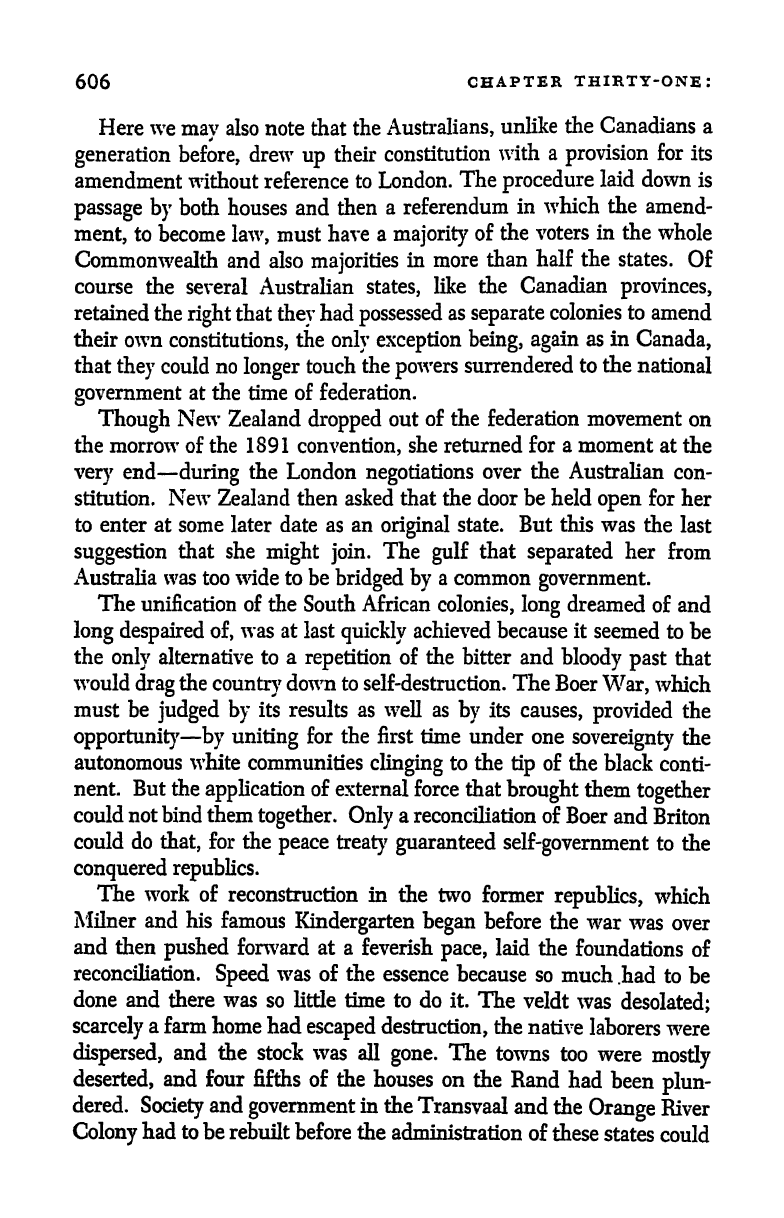
606
CHAPTER
THIRTY-ONE:
Here
we
may
also
note
that
the
Australians,
unlike
the
Canadians a
generation
before,
drew
up
their
constitution
with
a
provision
for
its
amendment
without
reference
to
London.
The
procedure
laid down
is
passage by
both
houses
and then
a
referendum
in
which
the
amend-
ment,
to
become
law,
must
have
a
majority
of
the
voters
in
the
whole
Commonwealth
and also
majorities
in more
than
half
the states.
Of
course
the
several
Australian
states,
like
the Canadian
provinces,
retained
the
right
that
they
had
possessed
as
separate
colonies to
amend
their
own
constitutions,
the
only exception
being, again
as
in
Canada,
that
they
could
no
longer
touch
the
powers
surrendered to
the
national
government
at the time of federation.
Though
New
Zealand
dropped
out
of the
federation movement
on
the morrow
of
the
1891
convention,
she returned
for
a
moment
at
the
very
end
during
the London
negotiations
over the
Australian
con-
stitution.
New Zealand then
asked
that the door be
held
open
for her
to enter at
some
later date
as
an
original
state. But
this was
the
last
suggestion
that she
might
join.
The
gulf
that
separated
her
from
Australia was too
wide
to
be
bridged
by
a
common
government.
The
unification
of
the South African
colonies,
long
dreamed
of
and
long
despaired
of,
was
at
last
quickly
achieved because
it
seemed to
be
the
only
alternative
to
a
repetition
of
the bitter
and
bloody
past
that
would
drag
the
country
down
to
self-destruction. The
Boer
War,
which
must be
judged by
its results as well as
by
its
causes,
provided
the
opportunity
by
uniting
for
the
first time under
one
sovereignty
the
autonomous
white
communities
clinging
to the
tip
of
the
black
conti-
nent. But
the
application
of
external
force that
brought
them
together
could
not
bind them
together.
Only
a
reconciliation
of
Boer
and
Briton
could
do
that,
for
the
peace treaty
guaranteed
self-government
to
the
conquered
republics.
TTbe work of
reconstruction in
the two
former
republics,
which
Milner
and his famous
Kindergarten
began
before the
war
was
over
and then
pushed
forward
at a
feverish
pace,
laid
the
foundations
of
reconciliation.
Speed
was of the
essence
because so
much
.had
to
be
done and
there
was
so
little
time to do it.
The
veldt
was
desolated;
scarcely
a
farm
home
had
escaped
destruction,
the
native
laborers
were
dispersed,
and the
stock
was all
gone.
The
towns
too
were
mostly
deserted,
and
four
fifths of
the
houses on
the
Rand
had
been
plun-
dered.
Society
and
government
in the
Transvaal
and
the
Orange
River
Colony
had
to be
rebuilt before
the
administration
of
these
states
could
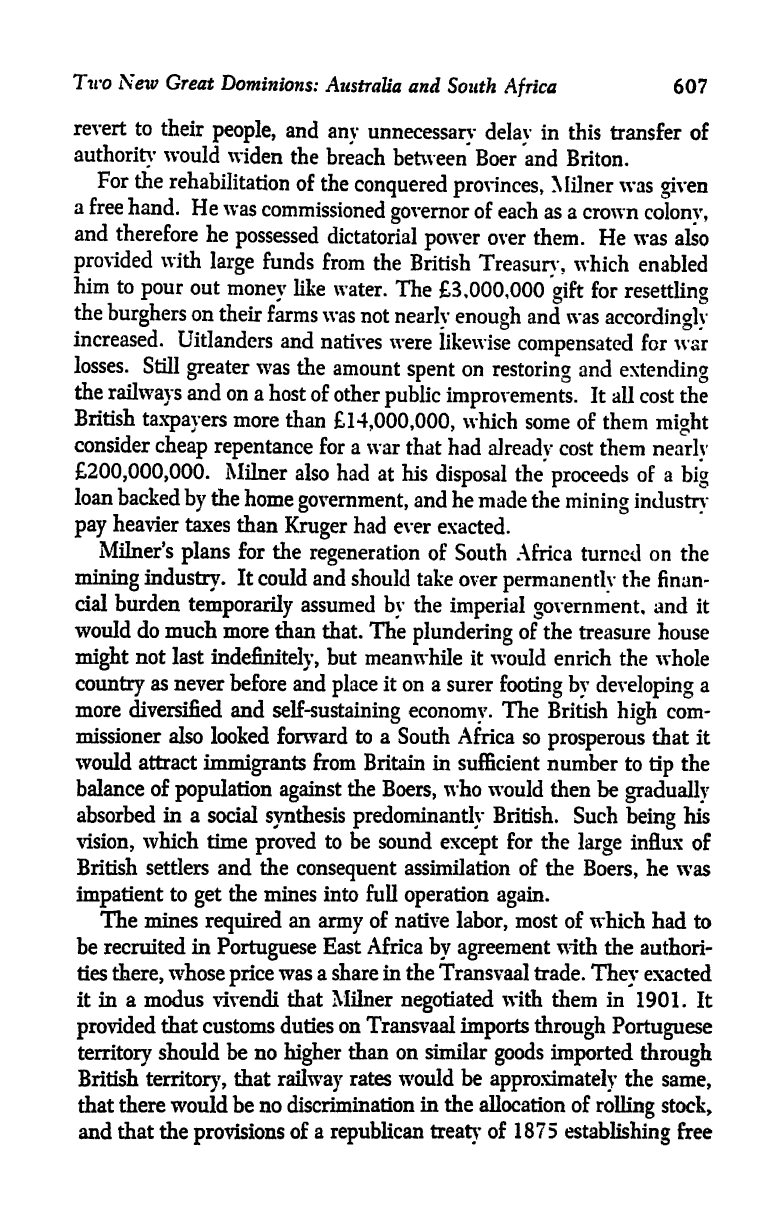
Ttro
New
Great
Dominions:
Australia and
South
Africa
607
revert
to
their
people,
and
any
unnecessary
delay
in this
transfer of
authority
would
widen
the
breach
between
Boer
and
Briton,
For
the
rehabilitation
of the
conquered
provinces,
Milner was
given
a
free
hand.
He
was
commissioned
governor
of
each
as a
crown
colony,
and
therefore
he
possessed
dictatorial
power
over
them. He
was
also
provided
with
large
funds
from
the
British
Treasury,
which
enabled
him
to
pour
out
money
like
water.
The
3,000,000
gift
for
resettling
the
burghers
on
their
farms
was not
nearly
enough
and
was
accordingly
increased.
Uitlanders
and
natives
were likewise
compensated
for war
losses.
Still
greater
was
the
amount
spent
on
restoring
and
extending
the
railways
and
on a
host
of
other
public
improvements.
It
all cost the
British
taxpayers
more
than
14,000,000,
which some
of
them
might
consider
cheap repentance
for
a war
that
had
already
cost them
nearly
200,000,000.
Milner
also
had
at
his
disposal
the
proceeds
of
a
big
loan
backed
by
the
home
government,
and he
made the
mining
industry
pay
heavier
taxes
than
Kruger
had
ever
exacted.
Milner's
plans
for
the
regeneration
of South
Africa
turned
on
the
mining industry.
It
could
and
should take
over
permanently
the
finan-
cial burden
temporarily
assumed
by
the
imperial
government,
and
it
would do
much
more than that. The
plundering
of the
treasure
house
might
not last
indefinitely,
but
meanwhile
it
would enrich the
whole
country
as
never
before
and
place
it
on a
surer
footing
by
developing
a
more
diversified
and
self-sustaining economy.
The
British
high
com-
missioner also
looked
forward
to a
South
Africa so
prosperous
that it
would attract
immigrants
from Britain in
sufficient
number
to
tip
the
balance of
population
against
the
Boers,
who
would then
be
gradually
absorbed
in a
social
synthesis
predominantly
British.
Such
being
his
vision,
which time
proved
to
be
sound
except
for the
large
influx
of
British settlers
and
the
consequent
assimilation of
the
Boers,
he was
impatient
to
get
the
mines
into full
operation
again.
The
mines
required
an
army
of
native
labor,
most of which
had to
be
recruited in
Portuguese
East
Africa
by
agreement
with
the authori-
ties
there,
whose
price
was a share in the Transvaal
trade.
They
exacted
it in
a
modus
vivendi that Milner
negotiated
with them in
1901.
It
provided
that
customs duties
on Transvaal
imports
through Portuguese
territory
should be no
higher
than
on
similar
goods imported
through
British
territory,
that
railway
rates would
be
approximately
the
same,
that
there
would
be no discrimination
in the
allocation
of
rolling
stock,
and
that the
provisions
of
a
republican treaty
of
1875
establishing
free
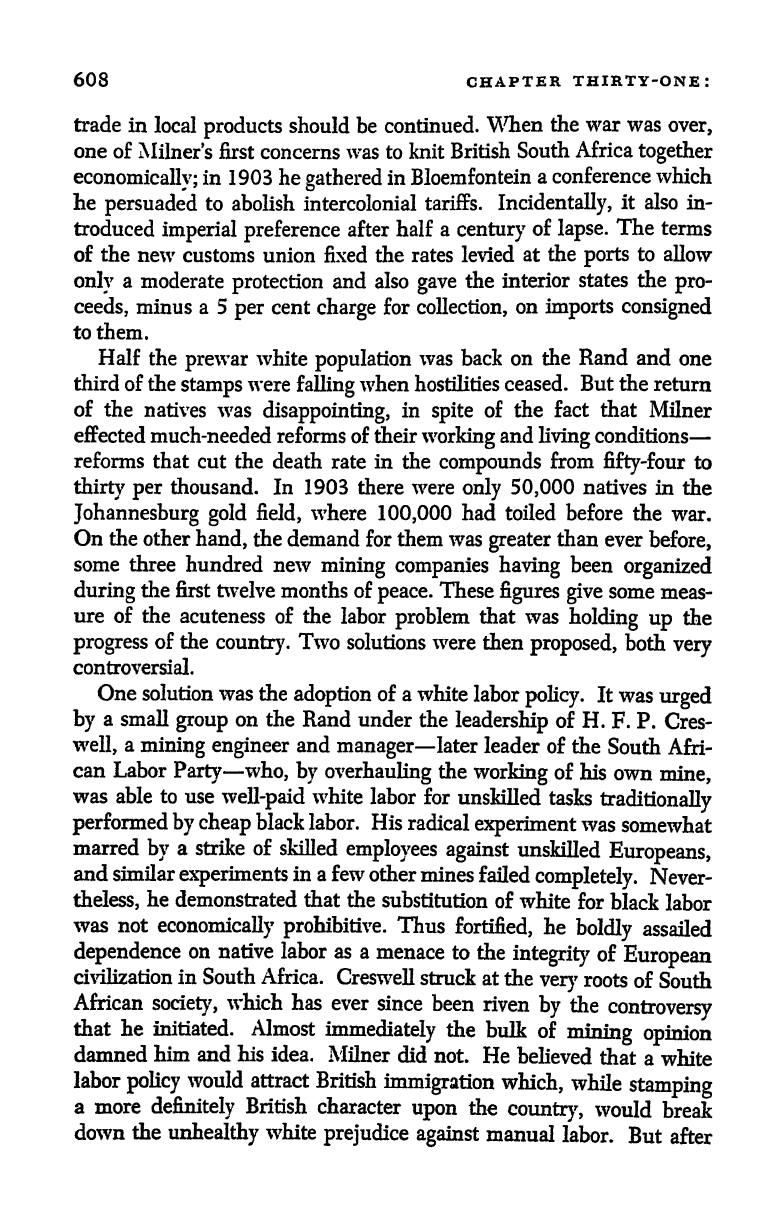
608
CHAPTER
THIRTY-ONE:
trade
in
local
products
should be
continued.
When
the
war
was
over,
one
of
Milner's first
concerns
was to
knit
British
South
Africa
together
economically;
in
1903 he
gathered
in Bloemfontein
a conference
which
he
persuaded
to abolish intercolonial
tariffs.
Incidentally,
it
also
in-
troduced
imperial preference
after half
a
century
of
lapse.
The
terms
of the
new
customs
union fixed the
rates
levied
at
the
ports
to
allow
only
a
moderate
protection
and also
gave
the
interior
states the
pro-
ceeds,
minus a 5
per
cent
charge
for
collection,
on
imports
consigned
to
them.
Half
the
prewar
white
population
was back on the
Rand
and
one
third
of the
stamps
were
falling
when hostilities
ceased.
But
the
return
of
the
natives was
disappointing,
in
spite
of
the
fact that
Milner
effected
much-needed reforms
of
their
working
and
living
conditions
reforms
that cut
the death
rate
in
the
compounds
from
fifty-four
to
thirty
per
thousand.
In
1903
there were
only
50,000
natives in
the
Johannesburg gold
field,
where
100,000
had toiled before
the
war.
On the other
hand,
the demand for them was
greater
than
ever
before,
some three
hundred new
mining
companies
having
been
organized
during
the first
twelve
months of
peace.
These
figures give
some
meas-
ure of
the
acuteness
of the labor
problem
that was
holding up
the
progress
of the
country.
Two solutions
were
then
proposed,
both
very
controversial.
One solution was the
adoption
of a
white
labor
policy.
It
was
urged
by
a
small
group
on
the Rand under
the
leadership
of H.
F.
P.
Cres-
well,
a
mining
engineer
and
manager
later
leader of
the
South
Afri-
can
Labor
Party
who,
by
overhauling
the
working
of
his
own
mine,
was able
to use
well-paid
white labor
for
unskilled tasks
traditionally
performed
by cheap
black
labor. His
radical
experiment
was
somewhat
marred
by
a strike of
skilled
employees
against
unskilled
Europeans,
and similar
experiments
in a few
other
mines
failed
completely.
Never-
theless,
he
demonstrated that
the
substitution
of
white
for
black
labor
was
not
economically prohibitive.
Thus
fortified,
he
boldly
assailed
dependence
on native
labor as a
menace
to the
integrity
of
European
civilization
in
South Africa.
Creswell
struck at
the
very
roots
of
South
African
society,
which
has ever
since
been
riven
by
the
controversy
that he initiated. Almost
immediately
the
bulk
of
mining
opinion
damned
him
and
his
idea.
Milner
did not.
He
believed
that
a
white
labor
policy
would attract British
immigration
which,
while
stamping
a more
definitely
British
character
upon
the
country,
would
break
down the
unhealthy
white
prejudice
against
manual
labor.
But
after
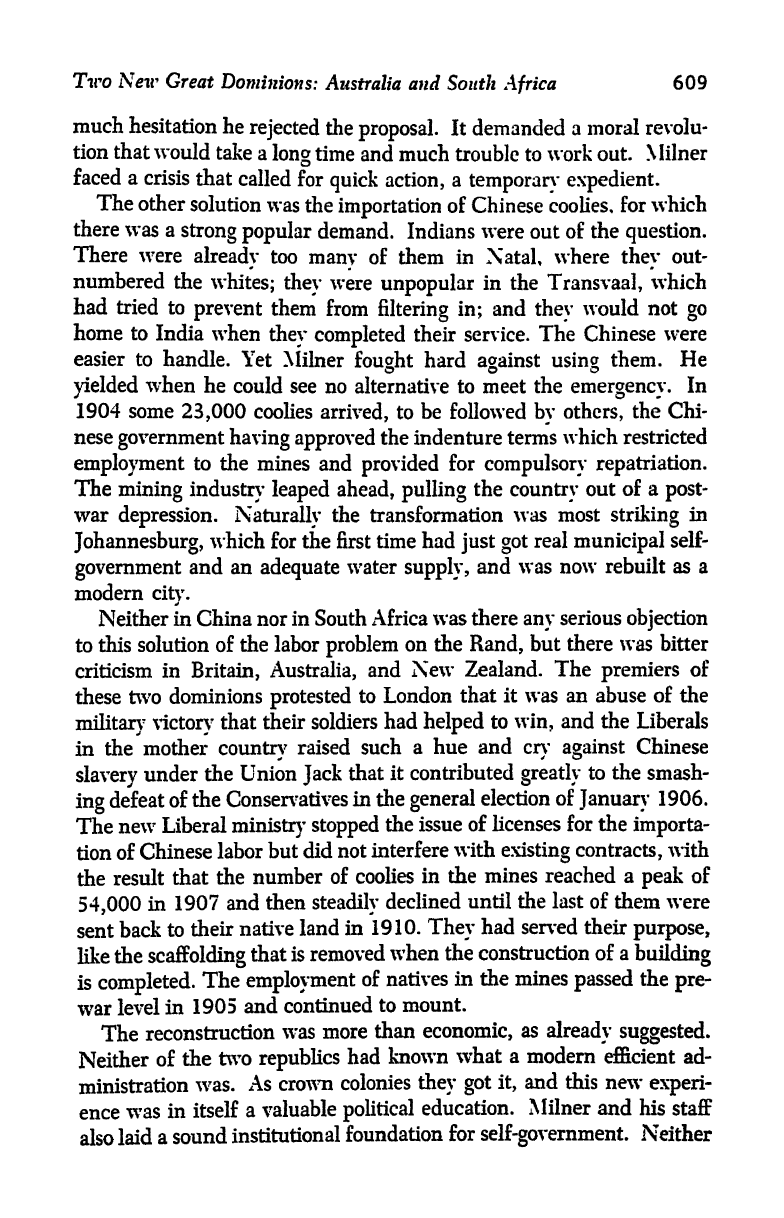
Tiro New
Great
Dominions:
Australia
and South
Africa
609
much
hesitation he
rejected
the
proposal.
It
demanded a
moral revolu-
tion
that
would
take a
long
time
and
much
trouble
to
work
out.
Milner
faced
a
crisis
that
called
for
quick
action,
a
temporary
expedient.
The
other
solution
was the
importation
of
Chinese coolies,
for which
there
was
a
strong
popular
demand. Indians
were out
of the
question.
There
were
already
too
many
of them
in
Natal,
where
they
out-
numbered
the
whites;
they
were
unpopular
in
the
Transvaal,
which
had
tried
to
prevent
them
from
filtering
in;
and
they
would
not
go
home
to
India
when
they
completed
their service.
The
Chinese
were
easier
to
handle.
Yet Milner
fought
hard
against
using
them.
He
yielded
when
he
could see no
alternative
to meet the
emergency.
In
1904 some
23,000
coolies
arrived,
to
be
followed
by
others,
the Chi-
nese
government
having approved
the indenture
terms
which restricted
employment
to the
mines and
provided
for
compulsory
repatriation.
The
mining industry leaped
ahead,
pulling
the
country
out
of
a
post-
war
depression.
Naturally
the transformation
was most
striking
in
Johannesburg,
which
for
the
first
time had
just
got
real
municipal
self-
government
and
an
adequate
water
supply,
and
was
now
rebuilt
as a
modern
city.
Neither in
China nor
in South Africa
was
there
any
serious
objection
to
this solution of
the
labor
problem
on the
Rand,
but
there was bitter
criticism
in
Britain,
Australia,
and New
Zealand.
The
premiers
of
these two
dominions
protested
to London
that
it
was
an
abuse
of the
military
victory
that
their soldiers
had
helped
to
win,
and
the
Liberals
in
the
mother
country
raised such
a hue
and
cry
against
Chinese
slavery
under
the
Union
Jack
that
it contributed
greatly
to the
smash-
ing
defeat
of
the
Conservatives
in
the
general
election of
January
1906.
The
new
Liberal
ministry stopped
the
issue of
licenses for
the
importa-
tion
of
Chinese
labor
but did not
interfere
with
existing
contracts,
with
the
result
that
the
number
of
coolies
in the
mines
reached
a
peak
of
54,000
in
1907
and
then
steadily
declined
until
the last
of them were
sent
back
to
their
native
land
in
1910.
They
had
served
their
purpose,
like
the
scaffolding
that is
removed
when the construction of
a
building
is
completed.
The
employment
of
natives
in the mines
passed
the
pre-
war
level
in
1905
and
continued
to
mount.
The
reconstruction
was more
than
economic,
as
already
suggested.
Neither
of
the
two
republics
had
known
what
a
modern
efficient
ad-
ministration
was.
As crown
colonies
they
got
it,
and
this
new
experi-
ence
was
in
itself
a valuable
political
education.
Milner
and his
staff
also
laid
a sound
institutional
foundation
for
self-government.
Neither
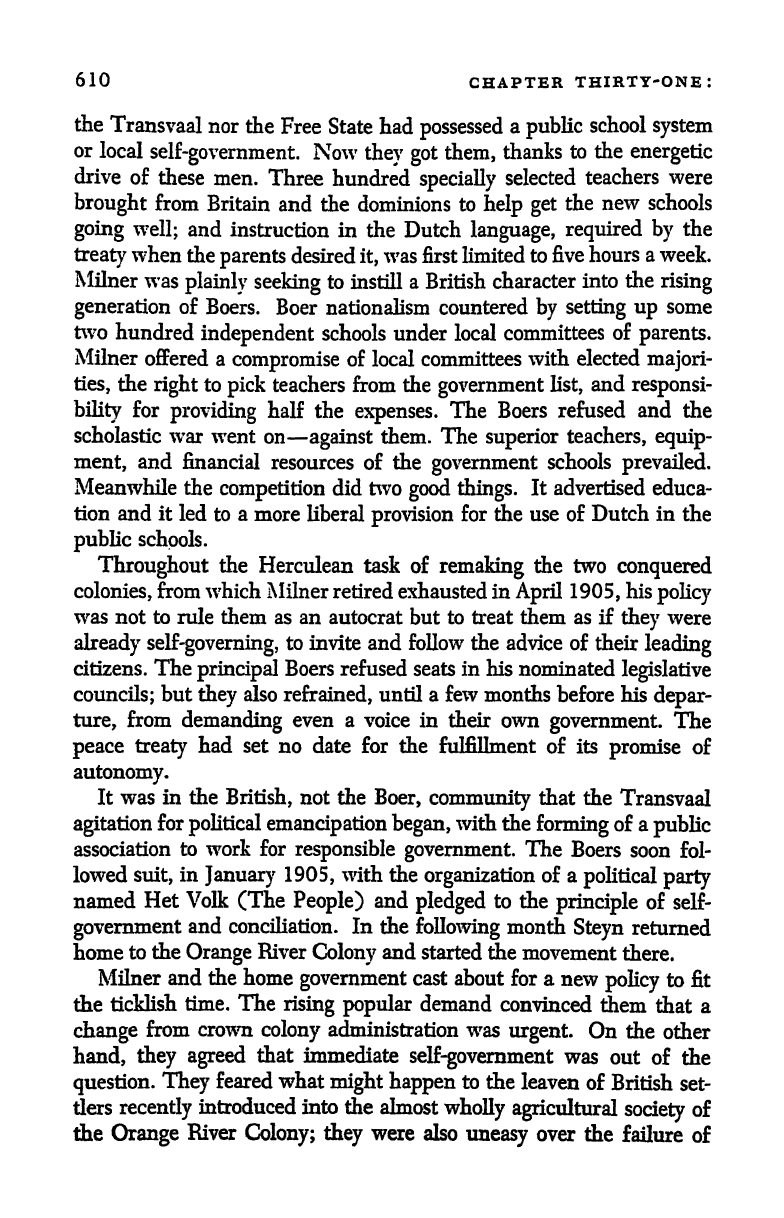
610
CHAPTER
THIRTY-ONE:
the
Transvaal
nor
the
Free
State had
possessed
a
public
school
system
or
local
self-government.
Now
they
got
them,
thanks
to
the
energetic
drive
of
these
men.
Three
hundred
specially
selected
teachers were
brought
from
Britain
and the dominions
to
help get
the
new schools
going
well;
and
instruction in the
Dutch
language,
required by
the
treaty
when
the
parents
desired
it,
was first limited
to
five
hours
a
week.
Milner
was
plainly
seeking
to
instill
a
British character
into
the
rising
generation
of
Boers.
Boer nationalism
countered
by
setting
up
some
two
hundred
independent
schools
under local
committees
of
parents.
Milner
offered a
compromise
of
local
committees
with
elected
majori-
ties,
the
right
to
pick
teachers
from the
government
list,
and
responsi-
bility
for
providing
half
the
expenses.
The Boers
refused
and
the
scholastic
war went
on
against
them.
The
superior
teachers,
equip-
ment,
and
financial
resources of the
government
schools
prevailed.
Meanwhile
the
competition
did two
good things.
It
advertised educa-
tion
and it led
to
a
more
liberal
provision
for
the use of
Dutch in
the
public
schools.
Throughout
the
Herculean task
of
remaking
the
two
conquered
colonies,
from which Milner
retired
exhausted
in
April
1905,
his
policy
was
not
to
rule them
as an autocrat
but
to treat them
as
if
they
were
already
self-governing,
to invite and
follow
the
advice of
their
leading
citizens.
The
principal
Boers
refused seats
in
his nominated
legislative
councils;
but
they
also
refrained,
until a few
months
before his
depar-
ture,
from
demanding
even
a
voice
in their
own
government.
The
peace treaty
had set
no date
for
the
fulfillment
of
its
promise
of
autonomy.
It
was
in the
British,
not the
Boer,
community
that the
Transvaal
agitation
for
political emancipation
began,
with the
forming
of a
public
association
to
work for
responsible
government.
The
Boers
soon
fol-
lowed
suit,
in
January
1905,
with the
organization
of
a
political
party
named
Het Volk
(The
People)
and
pledged
to
the
principle
of
self-
government
and conciliation.
In
the
following
month
Steyn
returned
home
to
the
Orange
River
Colony
and
started
the
movement
there.
Milner
and
the
home
government
cast
about
for a
new
policy
to
fit
the
ticklish
time. The
rising
popular
demand
convinced
them
that
a
change
from
crown
colony
administration
was
urgent.
On
the
other
hand,
they
agreed
that
immediate
self-government
was
out
of
the
question.
They
feared what
might
happen
to
the
leaven
of
British
set-
tlers
recently
introduced into
the
almost
wholly
agricultural
society
of
the
Orange
River
Colony; they
were
also
uneasy
over
the
failure
of
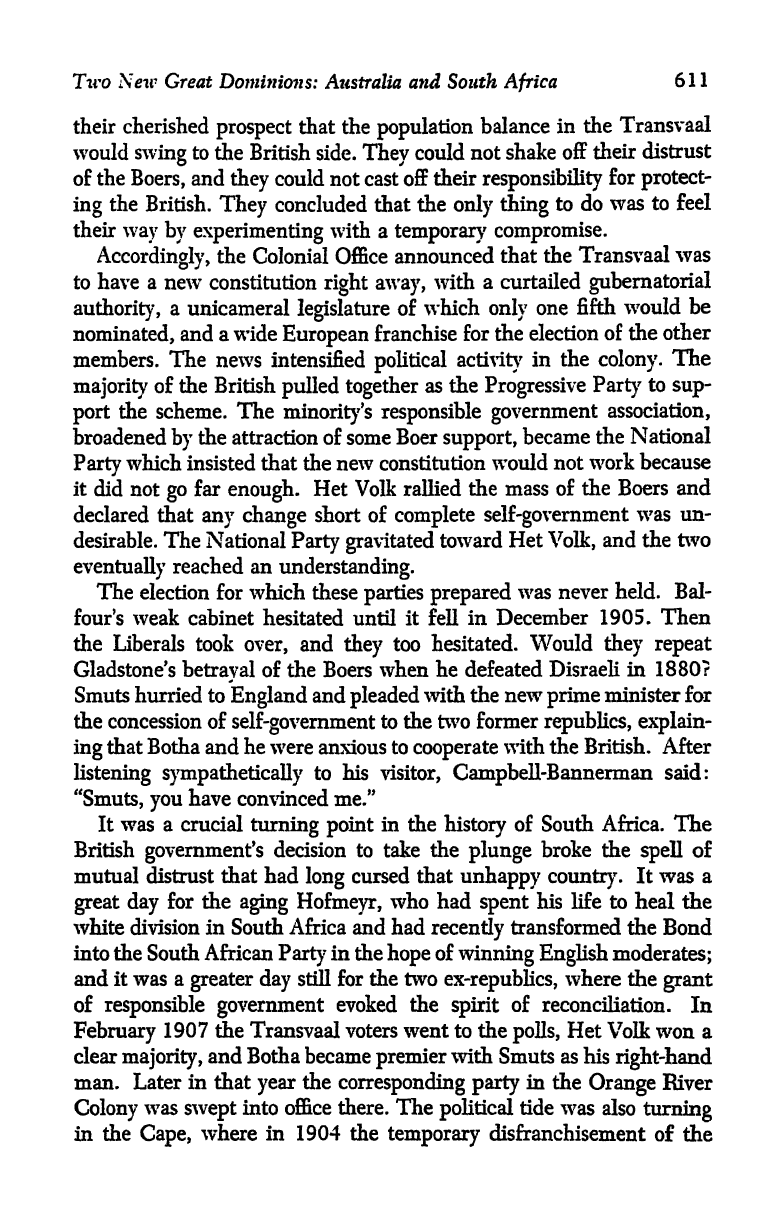
Two
Xeit
7
Great
Dominions: Australia and South
Africa
611
their
cherished
prospect
that the
population
balance
in
the
Transvaal
would
swing
to
the
British side.
They
could
not
shake off
their
distrust
of
the
Boers,
and
they
could not cast off
their
responsibility
for
protect-
ing
the
British,
They
concluded that
the
only thing
to do
was
to feel
their
way
by
experimenting
with
a
temporary
compromise.
Accordingly,
the
Colonial
Office
announced
that
the
Transvaal
was
to have
a
new
constitution
right
away,
with
a
curtailed
gubernatorial
authority,
a
unicameral
legislature
of
which
only
one
fifth
would
be
nominated,
and a wide
European
franchise
for the
election
of the
other
members.
The
news intensified
political
activity
in
the
colony.
The
majority
of the British
pulled
together
as the
Progressive
Party
to
sup-
port
the
scheme.
The
minority's responsible
government
association,
broadened
by
the attraction of some
Boer
support,
became
the
National
Party
which insisted that the
new constitution
would
not
work because
it
did not
go
far
enough.
Het
Volk
rallied
the mass
of
the
Boers
and
declared
that
any
change
short
of
complete
self-government
was
un-
desirable.
The National
Party
gravitated
toward
Het
Volk,
and the
two
eventually
reached
an
understanding.
The
election for which these
parties prepared
was never held.
Bal-
four's weak cabinet
hesitated until
it
fell
in December
1905.
Then
the Liberals
took
over,
and
they
too hesitated.
Would
they
repeat
Gladstone's
betrayal
of
the Boers
when he defeated Disraeli
in
1880?
Smuts hurried
to
England
and
pleaded
with
the new
prime
minister for
the
concession of
self-government
to
the
two former
republics,
explain-
ing
that Botha
and
he
were anxious to
cooperate
with the British.
After
listening sympathetically
to his
visitor,
Campbell-Bannerman
said:
"Smuts,
you
have convinced me."
It
was
a
crucial
turning
point
in
the
history
of South
Africa.
The
British
government's
decision to
take
the
plunge
broke the
spell
of
mutual distrust
that
had
long
cursed
that
unhappy
country.
It was
a
great
day
for
the
aging
Hofmeyr,
who
had
spent
his life to
heal the
white
division
in South
Africa and had
recently
transformed the
Bond
into the
South
African
Party
in
the
hope
of
winning
English
moderates;
and
it
was
a
greater
day
still
for
the
two
ex-republics,
where
the
grant
of
responsible
government
evoked
the
spirit
of
reconciliation.
In
February
1907 the
Transvaal
voters went
to
the
polls,
Het
Volk
won a
clear
majority,
and Botha
became
premier
with
Smuts as
his
right-hand
man. Later
in
that
year
the
corresponding
party
in
the
Orange
River
Colony
was
swept
into
office there. The
political
tide
was
also
turning
in
the
Cape,
where
in 1904 the
temporary
disfranchisement
of the
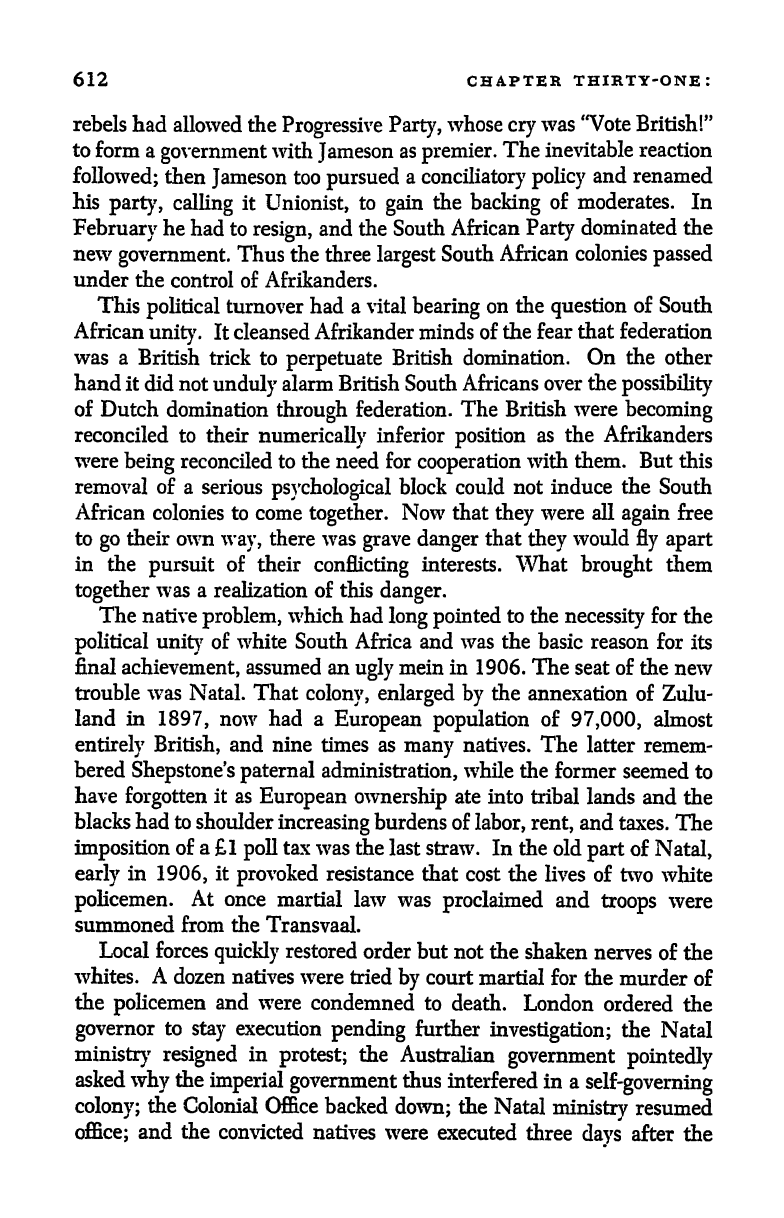
612 CHAPTER
THIRTY-ONE:
rebels
had
allowed
the
Progressive
Party,
whose
cry
was
"Vote British!"
to
form
a
government
with
Jameson
as
premier.
The
inevitable
reaction
followed;
then
Jameson
too
pursued
a
conciliatory policy
and
renamed
his
party,
calling
it
Unionist,
to
gain
the
backing
of moderates. In
February
he
had to
resign,
and
the South
African
Party
dominated the
new
government.
Thus the three
largest
South
African
colonies
passed
under the
control of
Afrikanders.
This
political
turnover
had
a vital
bearing
on
the
question
of
South
African
unity.
It
cleansed Afrikander minds of
the fear
that
federation
was
a
British trick to
perpetuate
British domination.
On
the
other
hand
it
did
not
unduly
alarm
British
South
Africans
over the
possibility
of Dutch
domination
through
federation.
The British
were
becoming
reconciled
to
their
numerically
inferior
position
as
the
Afrikanders
were
being
reconciled
to the
need
for
cooperation
with
them.
But
this
removal
of a
serious
psychological
block could not
induce
the
South
African
colonies to come
together.
Now
that
they
were
all
again
free
to
go
their own
way,
there
was
grave danger
that
they
would
fly
apart
in
the
pursuit
of
their
conflicting
interests.
What
brought
them
together
was a
realization
of
this
danger.
The native
problem,
which had
long
pointed
to
the
necessity
for
the
political
unity
of
white South Africa and was the
basic reason for
its
final
achievement,
assumed
an
ugly
mein
in
1906.
The
seat of
the
new
trouble
was Natal. That
colony,
enlarged
by
the
annexation of
Zulu-
land in
1897,
now had
a
European
population
of
97,000,
almost
entirely
British,
and
nine
times as
many
natives.
The
latter
remem-
bered
Shepstone's paternal
administration,
while
the
former
seemed
to
have
forgotten
it
as
European
ownership
ate into
tribal lands
and the
blacks had to
shoulder
increasing
burdens
of
labor,
rent,
and
taxes.
The
imposition
of
a
1
poll
tax
was the
last
straw.
In the
old
part
of
Natal,
early
in
1906,
it
provoked
resistance
that
cost
the
lives
of
two
white
policemen.
At once
martial law
was
proclaimed
and
troops
were
summoned from the
Transvaal.
Local
forces
quickly
restored
order
but not
the
shaken
nerves
of the
whites.
A
dozen natives were
tried
by
court
martial for
the
murder of
the
policemen
and were
condemned
to death.
London
ordered
the
governor
to
stay
execution
pending
further
investigation;
the
Natal
ministry resigned
in
protest;
the
Australian
government
pointedly
asked
why
the
imperial
go\
3r
ernment
thus
interfered in
a
self-governing
colony;
the
Colonial
Office
backed
down;
the
Natal
ministry
resumed
office;
and the
convicted
natives
were
executed
three
days
after
the
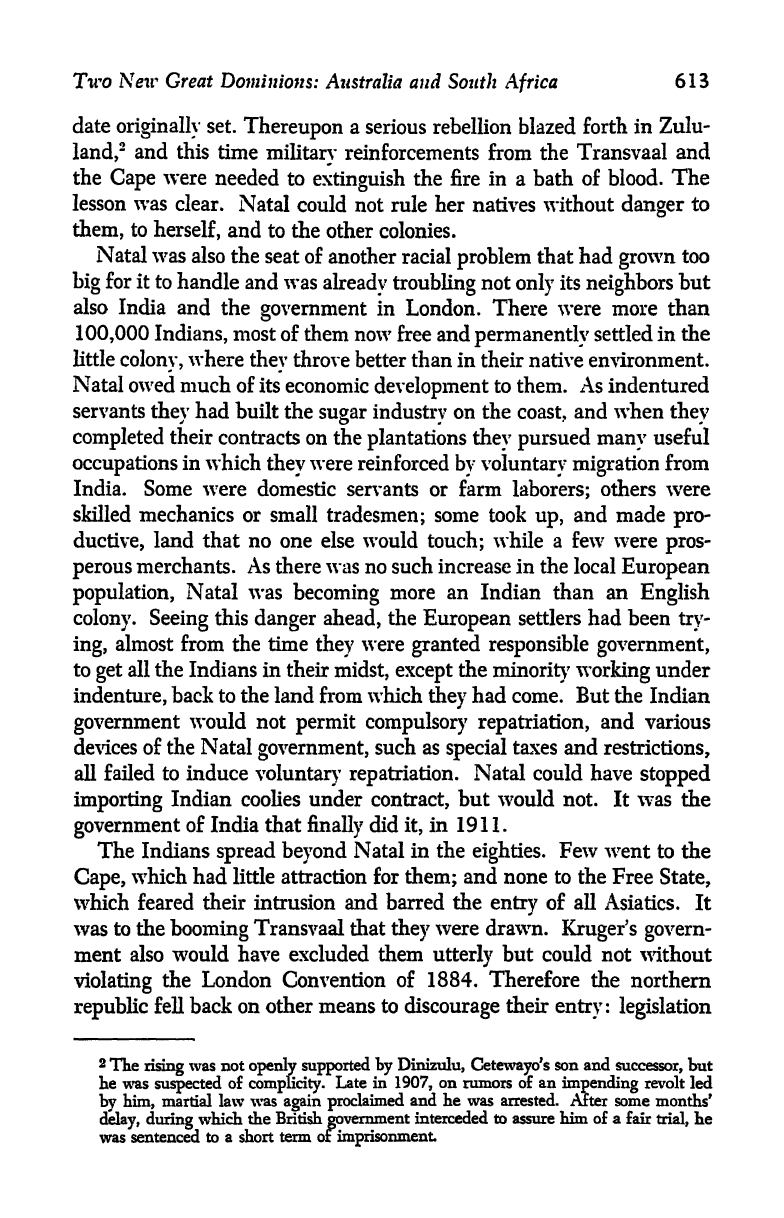
Ttro
New
Great
Dominions:
Australia and
South
Africa
613
date
originally
set.
Thereupon
a
serious
rebellion
blazed
forth
in
Zulu-
land,
2
and this
time
military
reinforcements
from the
Transvaal
and
the
Cape
were
needed
to
extinguish
the
fire
in
a bath
of blood.
The
lesson was
clear.
Natal
could not rule
her
natives
without
danger
to
them,
to
herself,
and
to
the
other colonies.
Natal was
also the
seat
of
another
racial
problem
that had
grown
too
big
for it
to
handle
and was
already
troubling
not
only
its
neighbors
but
also
India
and
the
government
in
London. There were more than
100,000
Indians,
most
of them
now
free
and
permanently
settled
in
the
little
colony,
where
they
throve better
than in
their native environment.
Natal
owed
much of
its
economic
development
to
them. As
indentured
servants
they
had
built the
sugar
industry
on
the
coast,
and
when
they
completed
their
contracts
on the
plantations
they pursued
many
useful
occupations
in
which
they
were reinforced
by
voluntary
migration
from
India. Some
were domestic
servants or farm
laborers;
others
were
skilled mechanics or small
tradesmen;
some
took
up,
and made
pro-
ductive,
land that
no
one else
would
touch;
while
a
few were
pros-
perous
merchants.
As
there
was
no such increase
in the
local
European
population,
Natal was
becoming
more
an Indian
than an
English
colony.
Seeing
this
danger
ahead,
the
European
settlers
had
been
try-
ing,
almost from
the
time
they
were
granted
responsible
government,
to
get
all
the
Indians
in their
midst,
except
the
minority
working
under
indenture,
back
to the land
from
which
they
had
come.
But the
Indian
government
would not
permit compulsory
repatriation,
and various
devices
of the Natal
government,
such as
special
taxes
and
restrictions,
all
failed
to
induce
voluntary
repatriation.
Natal could have
stopped
importing
Indian
coolies
under
contract,
but
would not.
It
was
the
government
of
India that
finally
did
it,
in 1911.
The Indians
spread beyond
Natal in the
eighties.
Few
went
to
the
Cape,
which
had little
attraction
for
them;
and none to the
Free
State,
which
feared
their
intrusion
and
barred
the
entry
of
all
Asiatics.
It
was
to the
booming
Transvaal that
they
were
drawn.
Kruger's govern-
ment
also
would
have
excluded
them
utterly
but could not
without
violating
the
London
Convention
of
1884. Therefore
the
northern
republic
fell back
on other means to
discourage
their
entry:
legislation
2
The
rising
was
not
openly supported
by
Dinizulu,
Cetewayo's
son and
successor,
but
he was
suspected
of
complicity.
Late
in
1907,
on
rumors of
an
impending
revolt
led
by
him,
martial law
was
again
proclaimed
and
he was arrested.
After
some
months'
delay,
during
which
the British
government
interceded to
assure
him of
a
fair
trial,
he
was
sentenced
to
a
short
term of
imprisonment
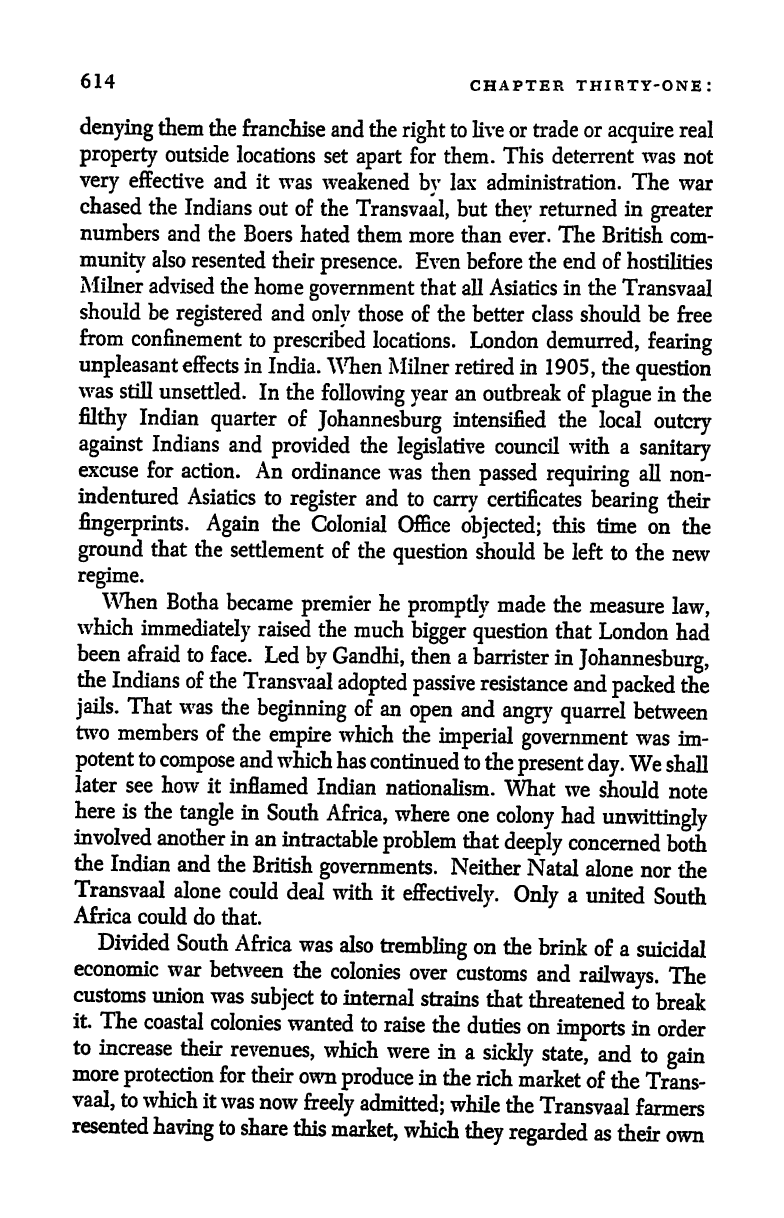
614
CHAPTER
THIRTY-ONE:
denying
them
the
franchise
and the
right
to
live
or trade or
acquire
real
property
outside
locations set
apart
for them. This deterrent
was not
very
effective
and it
was
weakened
by
lax
administration. The
war
chased
the
Indians
out
of
the
Transvaal,
but
they
returned in
greater
numbers
and
the
Boers
hated
them
more
than ever. The
British
com-
munity
also
resented their
presence.
Even
before
the end of
hostilities
Milner
advised
the
home
government
that
all
Asiatics
in
the
Transvaal
should
be
registered
and
only
those
of
the
better class
should
be
free
from
confinement
to
prescribed
locations.
London
demurred,
fearing
unpleasant
effects in
India.
When Milner
retired in
1905,
the
question
was
still
unsettled.
In the
following
year
an
outbreak of
plague
in
the
filthy
Indian
quarter
of
Johannesburg
intensified
the
local
outcry
against
Indians
and
provided
the
legislative
council with a
sanitary
excuse
for
action.
An
ordinance was
then
passed
requiring
all
non-
indentured
Asiatics
to
register
and
to
carry
certificates
bearing
their
fingerprints.
Again
the
Colonial Office
objected;
this
time
on
the
ground
that
the
settlement
of the
question
should be
left
to
the
new
regime.
When
Botha
became
premier
he
promptly
made
the
measure
law,
which
immediately
raised the
much
bigger question
that
London
had
been
afraid to
face.
Led
by
Gandhi,
then a
barrister
in
Johannesburg,
the
Indians
of
the
Transvaal
adopted
passive
resistance
and
packed
the
jails.
That
was
the
beginning
of
an
open
and
angry
quarrel
between
two
members of
the
empire
which
the
imperial
government
was
im-
potent
to
compose
and
which
has
continued
to
the
present
day.
We
shall
later
see
how
it
inflamed
Indian
nationalism.
What
we
should
note
here
is
the
tangle
in
South
Africa,
where
one
colony
had
unwittingly
involved
another
in an
intractable
problem
that
deeply
concerned
both
the
Indian
and
the
British
governments.
Neither
Natal
alone
nor
the
Transvaal
alone
could
deal
with
it
effectively.
Only
a
united
South
Africa
could
do that.
Divided
South
Africa
was
also
trembling
on
the
brink
of a
suicidal
economic
war
between
the
colonies
over
customs
and
railways.
The
customs
union
was
subject
to
internal
strains
that
threatened
to
break
it
The
coastal
colonies
wanted to
raise
the
duties
on
imports
in
order
to
increase
their
revenues,
which
were
in
a
sickly
state,
and
to
gain
more
protection
for
their
own
produce
in
the
rich
market
of
the
Trans-
vaal,
to
which it
was
now
freely
admitted;
while
the
Transvaal
farmers
resented
having
to
share
this
market,
which
they
regarded
as
their
own
